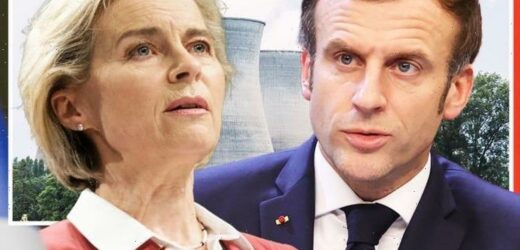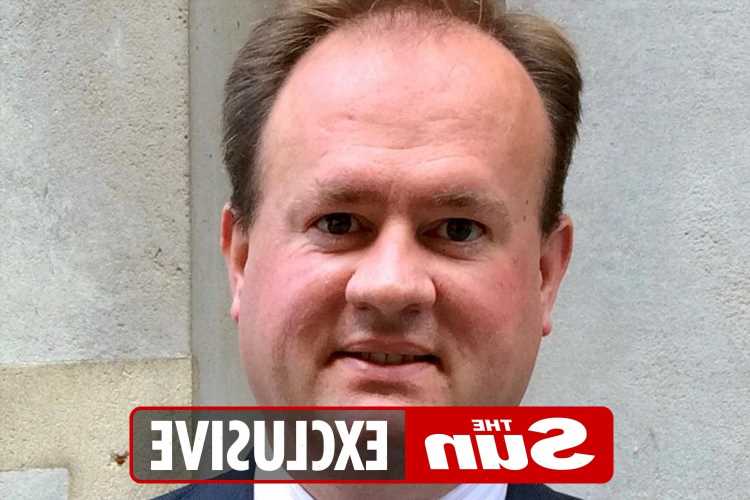UK taxpayer will contribute towards nuclear power strategy
We use your sign-up to provide content in ways you’ve consented to and to improve our understanding of you. This may include adverts from us and 3rd parties based on our understanding. You can unsubscribe at any time. More info
The French President said back in December that he is in favour “nuclear power being integrated into the taxonomy” on green finance. The EU’s taxonomy is intended to hand a green badge to companies and activities — or to withhold it — to “help shift investments where they are most needed.” This is part of the bloc’s aim to direct funding towards energy sources with a low or zero carbon footprint, but it has sparked fury among a group of countries who say it is not a “green” source
As France derives around 70 percent of its electricity from nuclear energy, it is perhaps no surprise that it has been pressing the EU to classify nuclear as green.
Mr Macron has pointed to the opinions of experts from the Intergovernmental Panel on Climate Change (IPCC) who say that “nuclear power is one of the solutions to decarbonise our economies”.
He has said: “Our strategy is to decarbonise our economies. To do this, we need renewable energies.”
But he noted that renewables are “intermittent, and thus not totally substitutable, even with our interconnections [in Europe], for non-intermittent sources of electricity production” like gas or nuclear power.
And now, the President of the European Commission, Ursula von der Leyen, has appeared to cave to pressure from France.


She has proposed to label fossil gas and nuclear power “transitional energies” in the EU’s green taxonomy.
The concession comes just days after France took on the presidency of the Council of the European Union.
But to carry out the plan, the bloc will need to invest €500billion (£416.58billion) in new nuclear energy facilities by 2050, according to EU commissioner for the internal market Thierry Breton.
He said in an interview for French newspaper Journal du Dimanche: “Existing nuclear plants alone will need €50billion (£41.66billion) of investment from now until 2030.
“And new generation ones will need €500billion.

“This effort represents around €20billion (£17billion) a year.”
And Mr Macron has been attacked by environmentalists for “greenwashing”.
Climate Action Network (CAN) claims: “The greenwashing operation being carried out by France is potentially costly.
”Billions of euros could be diverted away from investing in a just transition to a sustainable economy to finance the construction of new nuclear and fossil gas power plants, until at least 2045 and 2030 respectively.”
And while Ms von der Leyen has agreed to consider gas and nuclear power as “transitional”, CAN said this does not respect the principles of green finance.
DON’T MISS
Aztec breakthrough after ‘dark secret’ discovered beneath pyramid [REVEAL]
NO fourth Covid vaccine needed as new booster guidance given [INSIGHT]
Mystery bite mark on Great White Shark sparks Megalodon theory [REPORT]

This, CAN said, will undermine the European climate target of reducing emissions by 55 percent by 2030.
The group added: “Nuclear power does not meet the principle of “do no harm” to the environment due to the significant risks surrounding waste and pollution.
“The extremely expensive and slow deployment – demonstrated by delays recorded on reactor construction sites across Europe – confirms that nuclear power can in no way constitute a “transitional energy” useful for achieving the 2030 climate objective.
“Fossil gas is a proven source of greenhouse gas emissions and its consumption should be reduced by 30 percent by 2030 to reach the European climate target.
“To consider it as useful for the transition is a dangerous misstep that would divert the European Union from its climate target.”

The 27 countries of the bloc were due to submit feedback by Wednesday on the European Commission’s proposal.
But the January 12 deadline has now been pushed back to January 21 — the latest delay in the contentious process.
When asked for an explanation for the delay, the European Commission’s chief spokesman replied: “It’s only natural that we provide a bit more time.”
Politico reported: “That’s a bit rich given the Commission published the delegated act in the dying hours of 2021 and then gave countries just 12 days to respond.”
Source: Read Full Article


